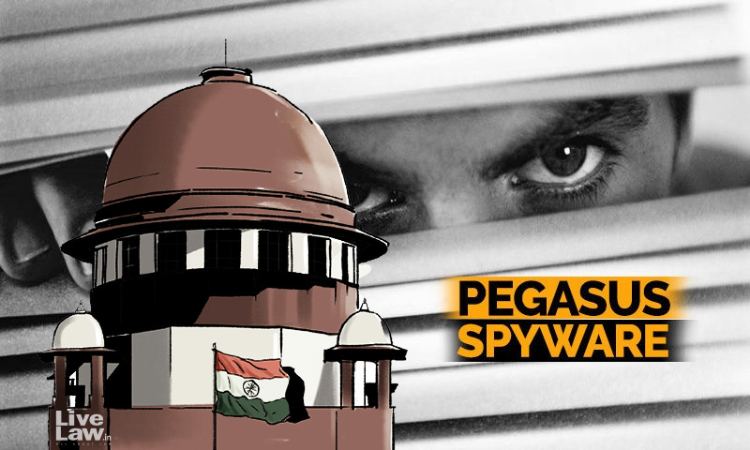Their Finest Hour: The Far Reaching Pegasus Verdict
Santhosh Paul, Senior Advocate
31 Oct 2021 4:34 PM IST

"Now this is not the end. It is not even the beginning of the end. But it is, perhaps, the end of the beginning." wrote Winston S. Churchill in his triumphal book 'Their Finest Hour". The 46-page order of the Hon'ble Supreme Court on the PILs calling for scrutiny of Pegasus hacking software being used in India has given a similar sense of exhilaration. A beginning of a new dawn is being felt, after the last few years saw a reluctant court failing to engage the government despite the slip sliding of our democratic foundations.
At the heart of the Pegasus controversy is the most insidious intrusion mankind has ever experienced at the hands of governments aided by technology. Big Brother is not just watching you, but also stealing everything which you considered to be your property in your private domain, and worse, probably bypassing statutory safeguards. The Pegasus spyware is engineered to access your smart phones and computer devices, mine the data, communicate the personal information retrieved and deliver it to a third party who uses the software to spy on the victim in real time.
While democracies across the world began denouncing this grave infraction by the hacking software, there has been a deafening silence by authoritarian regimes of varying degrees, or are certainly far from gold standard democracies. The disturbing aspect is that most of the 50,000 names snooped by the hacking software indicate that it targets journalists, opposition political figures, lawyers, human rights activists and those inconvenient to the ruling regimes. The revelations brought forth worldwide condemnation and investigations were launched across many democracies including the European Union where citizens were targeted. Legislators across the globe are working on "global rules needed to govern proliferation of these weapons of mass repression".
It is our constitutional credo that there is neither unfettered executive power nor is that power without safeguards to intrude into the private space and property of individual citizens. There are in place legislative contours demarcating a wall of safeguards for legitimate surveillance to take place. To assign these powers of unbridled intrusions to a foreign private player, in this case to NSO Group Technologies, Israel, is not just an issue of bartering away the hard-won constitutional rights, but also raises serious doubts regarding a country's sovereignty.
Democracies across the world have developed safeguards in the statute books and been subjected very regularly to judicial scrutiny to avoid abuses of power of this nature. They have ensured accountability by: (1) defining the nature of offences which trigger giving of permission to an interception/ data mining, (2) defining the categories of people whose telephones can be subjected to surveillance (3) putting in place elaborate checks and balances to be followed while examining, using and storing data which has been mined (4) elaborating upon the precautions to be taken when communicating the data to third parties. It has always been emphasized in constitutional democracies that there is no unfettered discretion for executive action in these matters.
Of course, the bogey of national security was deployed, a legal tactic used to avoid judicial scrutiny into every legal challenge to the unlawful invasion of privacy since time immemorial. The argument of the state was legitimately debunked without discounting legitimate concerns. The Court holding "this does not mean that the state gets a free pass every time the spectre of national security is raised", once again echoed the strains of the celebrated dissent in Liversidge v. Anderson [1941] 3 All ER 338, wherein it was stated that "judges are no respecters of persons and stand between the subject and any attempted encroachments on his liberty by the executive, alert to see that any coercive action is justified in law".
In Malone v. The United Kingdom (1985) 7 ECHR 14, the European Court of Human Rights dwelled on this subject and ruled on the right of the citizenry to ensure that the law is sufficiently clear, "to give citizens an adequate indication as to the circumstances in which and the conditions on which the public authorities are empowered to resort to this kind of secret and potentially dangerous interference with private life".
What is welcome in the recent Supreme Court decision is both the form and substance of the order passed by the Supreme Court. In any politically polarized society, an independent judge assigned the task to unearth the truth is a nationally valued possession. In this case, the appointment of Justice R.V. Raveendran to head the committee has given both credence and legitimacy to this process.
Much depends on how this committee will conduct the proceedings and enquire into the detailed and meticulously crafted terms of reference. They would have to deal with the machinations and stonewalling aimed at preventing meaningful enquiry. For here lies the ultimate litmus test of a functioning democracy.
All said and done, after the last few despondent years of the Supreme Court's lukewarm responses to serious challenges to democracy itself by avoiding hearing and adjudication on challenges to the CAA, challenges to the UAPA, revocation of Article 370 and incarceration of political prisoners, the time has probably come to say, "this is their finest hour".
The author is a Senior Advocate in the Supreme Court of India.Views are personal.


